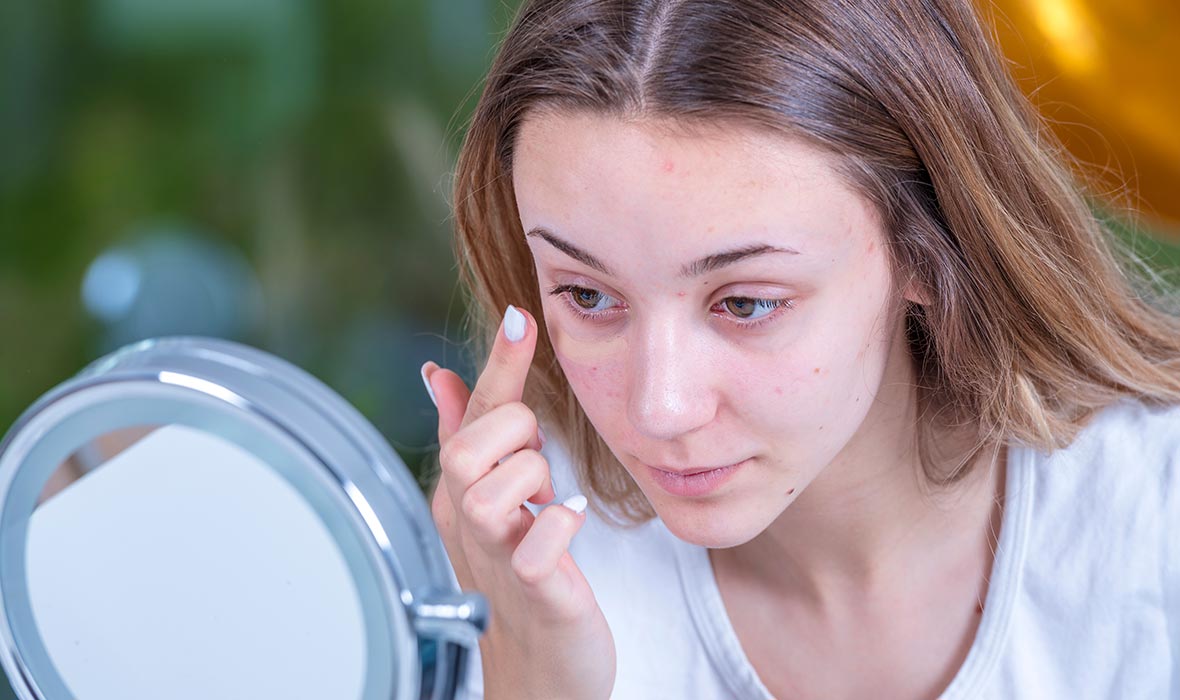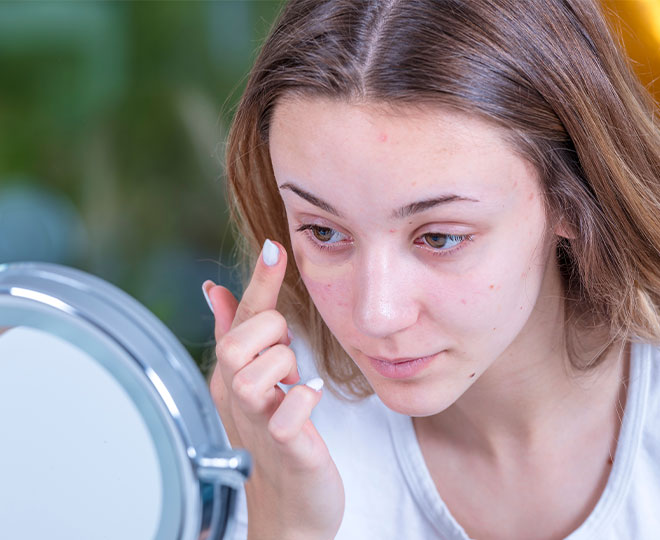Whether you wear makeup to look your best, to cover up acne that makes you feel self-conscious (or both), you may find yourself wondering, "Can makeup cause acne?" or "Does makeup make acne worse?". Before your brain starts to spin pondering this potential vicious cycle, know that you’re about to learn some super helpful tips about how to choose makeup that won’t cause a makeup breakout, lifestyle and hygiene tips to help prevent breakouts from makeup, and how to wear your favorite types of makeup without making your acne worse.
Does makeup cause acne?
In short, yes and no. It’s true that some cosmetics can contribute to the formation of acne. Acne caused by makeup is called Acne Cosmetica and shows up as tiny bumps or whiteheads on the forehead, chin or cheeks. If you’re noticing that you have pimples near your lips, your lipstick could be to blame. When you use oil-based or comedogenic makeup, and especially when you use it to cover acne, you’re contributing to more acne, prolonging the cycle.
The good news? There is makeup for acne-prone skin.
Makeup for acne-prone skin (hooray!)
It’s true — makeup doesn’t have to make your acne worse if you use non-comedogenic makeup and follow these tips.
Start clean. Always cleanse your face before applying makeup rather than adding more makeup on top of makeup you applied earlier in the day.Regularly clean your makeup brushes, sponges and applicators to avoid spreading bacteria into your pores. Aim for once per week. You can wash them with brush cleaner in the sink or even find makeup cleanser sprays.
Never share your makeup or makeup tools with other people. Sharing tools equals sharing bacteria, dead skin and oil. Those don’t seem worth it, even for the best color shade around.
Choose non-comedogenic, oil-free makeup that won’t clog pores. You can usually find these terms on the label. These are good for acne-prone skin because they’re formulated to not clog pores and specifically omit ingredients known to clog pores. And hey, avoiding additional blocking of your pores is a wonderful way to dodge some acne formation.
You should also stop using any makeup you have that is comedogenic. It may be hard to part with your favorite makeup, but it’s super easy to try part with the acne, right?
Use powder-based makeup instead of liquids. Yes, liquid makeup gives impressive coverage but check the label to make sure it’s non-comedogenic. Powder-based makeup feels light on the skin and can even help absorb excess oil and hide redness.
Not ready to purchase the powder? If you highly prefer liquid foundation, for example, look for one where water is the first ingredient instead of oil.
Read ingredient labels and avoid these ingredients. Want extra credit? Skim the ingredient label before you purchase new makeup and make sure you don’t see any of these highly-comedogenic ingredients and added colors and fragrances:
- acetylated lanolin
- algae extract
- benzaldehyde
- d & c red
- lauryl lysine
- lauric acid
- wheat germ oil
Don’t add layers of makeup. Even if you use the right makeup, layering it on too thickly can clog pores, so stick to one layer if you can.
Apply makeup gently. This will help avoid irritation that can lead to acne mechanica. Using makeup brushes helps you apply makeup with gentle strokes. Using your fingertips is okay as long as they are clean and you use a gentle touch.
Clean your makeup brushes weekly. You can use a makeup removing wash or spray your brushes with isopropyl (rubbing) alcohol then wipe the excess makeup and alcohol off on a paper towel.
Give your skin a makeup break. Leaving your skin makeup-free a few times a week can give it time to heal and breathe. Not comfortable without makeup? Remove your makeup and wash your face as soon as you get home.
Always remove makeup before bedtime. If you’re wearing heavy makeup you’ll want to use a makeup remover before you cleanse your face to make sure it’s all off. Yes, you still have to remove it before bed even if it’s just eye makeup as it can transfer onto your pillow and clog your pores.
While you sleep, your skin cells are in repair and rebuild mode, so removing makeup will allow your skin to breathe while it renews itself.
Use the less is more approach to makeup. Use as few makeup products as possible and, ideally, the fewer ingredients in the product, the better. Makeup should be the last thing you put on your face. A good approach to a morning product application is (in order): cleansing, acne treatment, moisturizer, sunscreen and then makeup.
Avoid wearing concealer and foundation while exercising or sweating. Even a non-comedogenic product may clog pores when it’s combined with heat, friction and sweat. And, make sure to wash your face as soon as possible after sweating.
Use an acne-fighting skincare system. Acne cosmetica may clear up when you stop using pore-clogging makeup. But, whether you wear makeup or not, your skin needs a good acne-fighting skincare routine if you’re prone to breakouts.
We recommend:
Proactiv Solution® Acne Treatment System - Designed specifically for acne-prone skin, Proactiv delivers finely-milled benzoyl peroxide deep into your pores to help stop acne-causing bacteria in its tracks and prevent new breakouts from forming.
Proactiv +®Acne Treatment System - This was designed to deliver acne-fighting medicine directly into the pores. The result? The healthy-looking skin you’ve always wanted.
ProactivMD® 3-Piece System - This system features our renowned, prescription-strength retinoid – no Rx required – and helps clear and prevent stubborn breakouts and helps to restore healthy skin.
But don’t just take our word for it – check out real reviews from people that have visibly transformed their skin with proactiv.
Choose your hair products and sunscreen carefully, too.
Fighting acne doesn’t stop at your makeup. Choosing a non-comedogenic sunscreen is also important. Plus, some hair products (gel, mousse, pomade) can cause breakouts on the scalp and near the hairline if they contain ingredients that irritate your skin. Others may clog your pores by trapping bacteria and dead skin cells inside them. The same goes for other skincare creams and moisturizers.
The bottom line
Practicing the right skincare habits, executing a regular routine of cleansing and hydrating your skin, and sticking to non-comedogenic makeup can help keep acne at bay — and that’s a beautiful thing.






